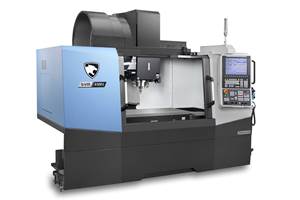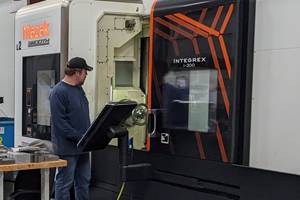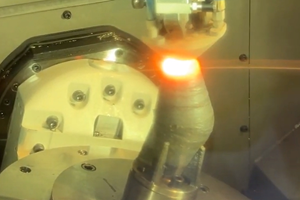Expanded Possibilities for Cryogenic Machining
The technology for liquid nitrogen cooling is now available for machining applications in various industries on any brand of machine tool.
Share




Hwacheon Machinery America, Inc.
Featured Content
View More




Takumi USA
Featured Content
View More.png;maxWidth=45)
DMG MORI - Cincinnati
Featured Content
View MoreWhen the machine tool brands associated with MAG Americas were recently sold to the Fives Group, the former company’s cryogenic machining technology was not included in this sale. Instead, cryogenic machining was one of various technologies, products and services that were retained, a list that also includes software for monitoring and responding to machine tool performance (“Freedom eLog” and related software), cutting tool and coolant product lines, holemaking equipment, and manufacturing services ranging from turnkeys and application engineering to lean and Six Sigma consulting. All of these offerings are now available through the newly established 5ME, a machining technology and service business with headquarters in Cincinnati, Ohio, and a tech center in Warren, Mich.
Peter Tecos is executive VP of marketing and product strategy with the new company. He says cryogenic machining’s inclusion in the new firm can only help this technology advance, because now there are no competitive constraints inhibiting its application. 5ME, an independent company, is free to apply the technology to any builder’s machine tool.
Cryogenic machining achieves tool life and productivity gains in difficult-to-machine materials such as titanium, Inconel, compacted graphite iron (CGI) and hardened steel. In cryogenic machining, liquid nitrogen at -321°F is delivered to the cutting edge through the machine’s spindle or turret and through the cutting tool. The low-temperature fluid has the effect of turning the cutting tool into a heat sink, expanding the tool’s capacity to absorb energy. With the supercooled tool drawing heat away from the cut, the rate of tool wear is reduced to such an extent that tool life and productivity increases can often be obtained simultaneously. In titanium and CGI, tool life improvement of a factor of 10 has been documented at twice the cutting speeds typical for these materials. The technology is available for field retrofit and could be incorporated as an option on new machines. Mr. Tecos says 5ME is in the process of cultivating relationships with machine tool builders.
Among the end users already applying cryogenic machining in manufacturing are companies in the aircraft industry. According to George Georgiou, 5ME’s director of engineering, an additional benefit companies in this sector have found is that cryogenic machining prevents the formation of an untempered martensitic “white layer” on the machined surface. This layer is detrimental to an aircraft part because it encourages cracks. The discovery is significant, because it means cryogenic machining can eliminate the acid bath usually used to remove this layer.
The oil and gas industry is another sector in which 5ME is seeing strong interest, Mr. Tecos says. Makers of downhole tools increasingly employ the types of high-temperature alloys associated with aircraft production. Some of these manufacturers see potential for significant manufacturing cost savings from liquid nitrogen cooling, and because they do not face the certification requirements of the aircraft industry, they are free to implement the new technology more quickly.
One other promising sector is the medical implant industry, he says. Implant makers routinely machine titanium, and they are obliged to ensure that metalworking fluids do not contaminate the part. This latter requirement creates a notable advantage for liquid nitrogen, which evaporates upon contact with the air and does not affect the workpiece any more than the ambient air does. After all, the ambient air itself is mostly nitrogen.
Meanwhile, the medical industry is also important to 5ME because manufacturers in this sector fit the profile of facilities the company is best equipped to serve. Rather than being a machine tool supplier, Mr. Tecos says 5ME is essentially an “efficiency supplier.” The company’s products—tooling, technology, software, services—all relate to winning increased efficiency from existing machines. Offering efficiency gain as an end product might seem like an unusual role for a supplier, but arguably it is a logical one in an environment in which machining facilities with minimal staffing no longer have the expertise or available time internally to explore and engineer process improvements.
In the medical industry, production facilities are characterized by machining of challenging materials, a large number and diversity of machine tools, and a high cost being paid for consumables. Mr. Tecos says all of those factors describe conditions in which the new, unusual company is likely to be able to deliver savings.
Related Content
DN Solutions Introduces High-Productivity Vertical Machining Center
The SVM 5100L’s performance has been optimized to reduce the acceleration/deceleration times of the XYZ axes and spindle, reducing non-cutting time.
Read MoreMitsui Seiki's Compact VMC Offers High-Precision Milling
The VL30 series is designed to machines high-precision mold inserts for medical, packaging, industrial and aerospace applications.
Read More5 Tips for Running a Profitable Aerospace Shop
Aerospace machining is a demanding and competitive sector of manufacturing, but this shop demonstrates five ways to find aerospace success.
Read MoreAdditive/Subtractive Hybrid CNC Machine Tools Continue to Make Gains (Includes Video)
The hybrid machine tool is an idea that continues to advance. Two important developments of recent years expand the possibilities for this platform.
Read MoreRead Next
5 Rules of Thumb for Buying CNC Machine Tools
Use these tips to carefully plan your machine tool purchases and to avoid regretting your decision later.
Read MoreBuilding Out a Foundation for Student Machinists
Autodesk and Haas have teamed up to produce an introductory course for students that covers the basics of CAD, CAM and CNC while providing them with a portfolio part.
Read MoreRegistration Now Open for the Precision Machining Technology Show (PMTS) 2025
The precision machining industry’s premier event returns to Cleveland, OH, April 1-3.
Read More






























.jpg;maxWidth=300;quality=90)






.jpg;maxWidth=300;quality=90)









